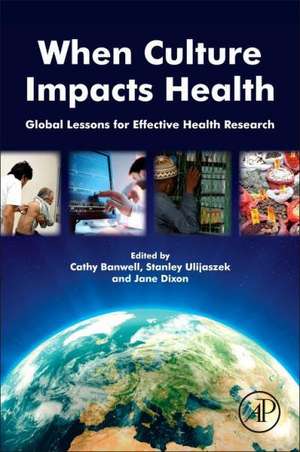When Culture Impacts Health: Global Lessons for Effective Health Research
Editat de Cathy Banwell, Stanley Ulijaszek, Jane Dixonen Limba Engleză Paperback – 26 mar 2013
- Discusses global application of case descriptions
- Demonstrates how a cultural approach to health research enriches and informs our understanding of intractable public health problems
- Covers methods and measurements applicable to a variety of cultural research approaches as well as actual research results
- Case studies include medical anthropology, cultural epidemiology, cultural history and social medicine perspectives
Preț: 316.70 lei
Preț vechi: 432.43 lei
-27% Nou
Puncte Express: 475
Preț estimativ în valută:
60.60€ • 63.40$ • 50.34£
60.60€ • 63.40$ • 50.34£
Carte tipărită la comandă
Livrare economică 27 martie-10 aprilie
Preluare comenzi: 021 569.72.76
Specificații
ISBN-13: 9780124159211
ISBN-10: 0124159214
Pagini: 380
Dimensiuni: 152 x 229 x 23 mm
Greutate: 0.61 kg
Editura: ELSEVIER SCIENCE
ISBN-10: 0124159214
Pagini: 380
Dimensiuni: 152 x 229 x 23 mm
Greutate: 0.61 kg
Editura: ELSEVIER SCIENCE
Public țintă
Researchers and graduate and undergraduate students in public health and epidemiology, government public health organizations, anthropology health economists, physicians, nurses and others seeking an overview of public health.Cuprins
1. When culture impacts health
Part A – Research approaches
2. The antecendents to culture in health research: perspectives from the social sciences
3. Biological and biocultural anthropology
4. Toward Cultural Epidemiology: Beyond Epistemological Hegemony
5. The cultural anthropological contribution to communicable disease epidemiology
Part B - Local tales
I. Industrial and post-industrial societies
6. Medicalisation or medicine as culture? : The case of ADHD
7. Filthy fingernails and friendly germs: Lay concepts of contagious disease transmission in developed countries
8. Context and environment: The value of considering lay epidemiology
9. Identity, social position, wellbeing and health: insights from Australians living with hearing loss
10. Framing debates about risk for skin cancer and vitamin D deficiency in New Zealand: Ethnicity, skin colour and / or cultural practice?
11. Analysing smoking using Te Whare Tapa Wha
12. Thirty years of New Zealand smoking advances a case for cultural epidemiology and cultural geography
13. On Slimming Pills, Growth Hormones, and Plastic Surgery: The Socioeconomic Value of the Body in South Korea
II. Economically transitioning societies
14. Tacking between disciplines Approaches to tuberculosis in New Zealand, Cook Islands and Tuvalu
15. Social determinants of health in a Papuan village
16. Life and well-being under historical ecological variation: the epidemiology of disease and of representations
17. Perceptions of Leprosy in the Orang Asli (indigenous minority) of Peninsular Malaysia
18. A qualitative exploration of factors affection uptake of water treatment technology in rural Bangladesh
19. Anthropological approaches to outbreak investigations in Bangladesh
20. Post-Disaster Coping in Aceh: Sociocultural Factors and Emotional Response
Part C – Methodological Lessons
21. Non-Indigenous and Indigenous Australians: cultural-social positioning and health
22. Capturing the capitals; a heuristic for measuring ‘wealth’ of NZ children in the 21st century. An application to the Growing Up in New Zealand longitudinal cohort
23. Cultural consensus modeling of disease
24. Meaning and measurement – research with African immigrants in Australia
25. The cultural economy approach to studying chronic disease risks, with application to illicit drug use
26. Doing health policy research: how to interview policy elites
27. Thai food culture in transition: a mixed methods study on the role of food retailing
28. Developing culturally appropriate interventions to prevent person-to person transmission of Nipah Virus in Bangladesh: cultural epidemiology in action
Conclusion
29. From local tales to global lessons
30. Complementary readings
Part A – Research approaches
2. The antecendents to culture in health research: perspectives from the social sciences
3. Biological and biocultural anthropology
4. Toward Cultural Epidemiology: Beyond Epistemological Hegemony
5. The cultural anthropological contribution to communicable disease epidemiology
Part B - Local tales
I. Industrial and post-industrial societies
6. Medicalisation or medicine as culture? : The case of ADHD
7. Filthy fingernails and friendly germs: Lay concepts of contagious disease transmission in developed countries
8. Context and environment: The value of considering lay epidemiology
9. Identity, social position, wellbeing and health: insights from Australians living with hearing loss
10. Framing debates about risk for skin cancer and vitamin D deficiency in New Zealand: Ethnicity, skin colour and / or cultural practice?
11. Analysing smoking using Te Whare Tapa Wha
12. Thirty years of New Zealand smoking advances a case for cultural epidemiology and cultural geography
13. On Slimming Pills, Growth Hormones, and Plastic Surgery: The Socioeconomic Value of the Body in South Korea
II. Economically transitioning societies
14. Tacking between disciplines Approaches to tuberculosis in New Zealand, Cook Islands and Tuvalu
15. Social determinants of health in a Papuan village
16. Life and well-being under historical ecological variation: the epidemiology of disease and of representations
17. Perceptions of Leprosy in the Orang Asli (indigenous minority) of Peninsular Malaysia
18. A qualitative exploration of factors affection uptake of water treatment technology in rural Bangladesh
19. Anthropological approaches to outbreak investigations in Bangladesh
20. Post-Disaster Coping in Aceh: Sociocultural Factors and Emotional Response
Part C – Methodological Lessons
21. Non-Indigenous and Indigenous Australians: cultural-social positioning and health
22. Capturing the capitals; a heuristic for measuring ‘wealth’ of NZ children in the 21st century. An application to the Growing Up in New Zealand longitudinal cohort
23. Cultural consensus modeling of disease
24. Meaning and measurement – research with African immigrants in Australia
25. The cultural economy approach to studying chronic disease risks, with application to illicit drug use
26. Doing health policy research: how to interview policy elites
27. Thai food culture in transition: a mixed methods study on the role of food retailing
28. Developing culturally appropriate interventions to prevent person-to person transmission of Nipah Virus in Bangladesh: cultural epidemiology in action
Conclusion
29. From local tales to global lessons
30. Complementary readings
Recenzii
"Banwell, Ulijaszek, and Dixon assemble 30 essays by health sociology, medical and bio-anthropology, cultural anthropology, and epidemiology researchers from Australia, New Zealand, Bangladesh, and the UK, who provide medical anthropologists and social epidemiologists with conceptual and measurement tools to improve their understanding of how culture affects population health behaviors and chronic and infectious disease risks and demonstrate how public health can influence culture to encourage healthy lifestyles." --Reference and Research Book News, August 2013









